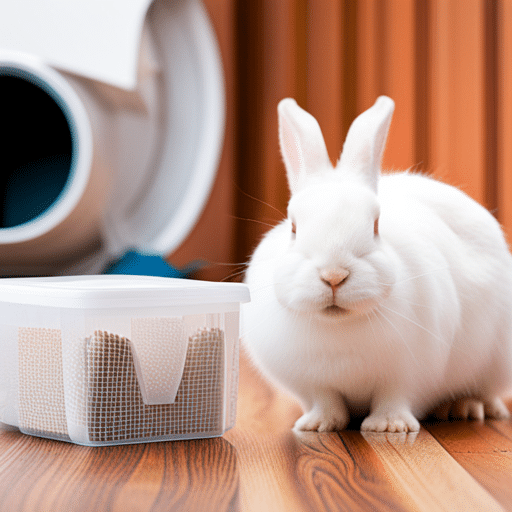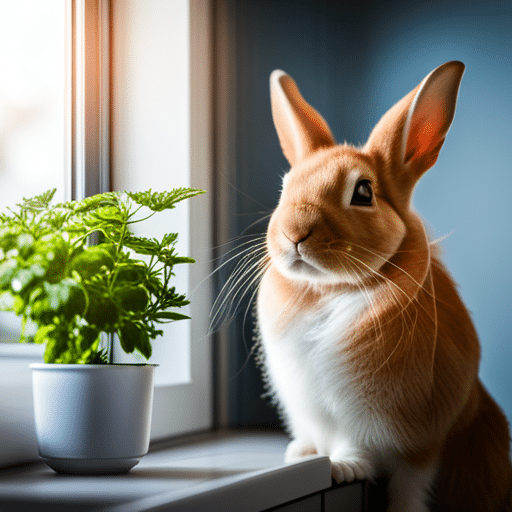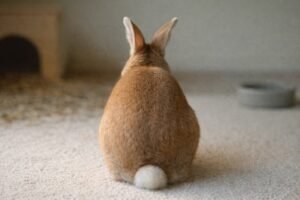Rabbits are delightful pets, known for their playful and inquisitive nature. However, without proper care and maintenance, they can sometimes emanate a less-than-pleasant smell. Fortunately, this issue is often preventable with the right knowledge and practices. This article will guide you through the process of keeping your rabbit and its habitat fresh and odor-free.
Short Summary
Regularly clean your rabbit’s cage and use odor-control bedding to maintain a fresh environment.
Ensure a balanced diet and proper litter training for your rabbit to reduce smell.
Use rabbit-safe cleaning products to deodorize the habitat and consider air purifiers for overall odor control.
Regular grooming and healthcare, including checking and cleaning scent glands, are crucial in keeping your rabbit smell-free.
Provide your rabbit with the right attention and care to keep it healthy and smelling pleasant in your home.
The Basic Rabbit Smells You Might Encounter

Rabbits are generally clean animals, but certain smells can arise from their habitat, diet, or health issues. Common sources of odor include rabbit pee, rabbit poop, and scent glands. Understanding these can help you identify and tackle the problem effectively.
How to Keep Your Rabbit Enclosure From Smelling
A clean habitat is crucial in keeping your rabbit’ cage from smelling. Regularly wash your rabbit’s cage, keep its litter box clean, and use effective odor-control rabbit bedding. Avoid bedding materials that could amplify the smell, such as cedar or pine shavings.
Healthy Diet
A balanced diet is pivotal in maintaining your rabbit’s health and minimizing unpleasant odors. Rabbits should primarily consume hay, which aids in digestion and reduces the smell of their poop. Additionally, provide fresh vegetables and limited quantities of fruits as part of their diet. Overfed and obese rabbits often produce more waste, leading to increased odors.
Avoid feeding your rabbit with inappropriate foods such as cereals, nuts, seeds, or high-sugar treats, as these can potentially lead to gastrointestinal problems and contribute to foul-smelling waste. Regular access to clean water is also essential, as dehydration can intensify the smell of rabbit urine. Implementing a healthy diet not only reduces odors but also ensures your rabbit’s longevity and vitality.
Remember, sudden changes in a rabbit’s diet can cause digestive disturbances, so introduce new foods gradually. Monitor your rabbit for any changes in their eating habits or pooping patterns, as these could indicate health issues that may also increase odors. If you notice any such changes, consult a vet promptly.
Litter Train Your Rabbit

Litter training your rabbit can significantly reduce the smell in your home. Rabbits are naturally inclined to use a single spot for their waste, making them relatively easy to litter train. Provide a litter box with rabbit-safe litter and patiently teach your pet to use it. This will confine the smell to a specific area and make it easier to manage. It’s also worth noting that some rabbits may even pee in different spots, so you may consider providing multiple litter boxes.
Importance of Regular Grooming and Healthcare
Regular grooming and healthcare also play an integral part in odor control. Bathing your rabbit is generally not recommended, but you can clean its fur with unscented baby wipes. Regularly check and clean your rabbit’s scent glands to avoid clogging. Ensure to spay or neuter your rabbit, as unaltered rabbits tend to have a stronger odor.
Effective Cleaning Products and Odor-Control Rabbit Bedding
Cleaning products are available to help with odor control for pet rabbits. When selecting a product, make sure it is safe for rabbits and does not contain harmful chemicals or fragrances. Use an air purifier to reduce the smell in your home, and consider using odor-control rabbit bedding such as paper-based bedding or shredded newspaper.
Air Fresheners and Air Purifiers: Essential Tools in Combating Unwanted Odors

Air fresheners and air purifiers serve as valuable allies in your mission to keep your home free from unwanted rabbit odors. While both of these tools have their distinct roles, it’s essential to use them wisely for their maximum effectiveness and your rabbit’s safety. Air fresheners can provide a quick fix to mask unpleasant odors, but remember to opt for those free of harmful chemicals and strong fragrances which could irritate or even harm your rabbit. Using them sparingly and strategically around your home can contribute to a fresher ambiance without causing distress to your pet.
Meanwhile, air purifiers go a step beyond merely masking smells. They work tirelessly to filter and cleanse the air, removing particles responsible for the unpleasant odors. They also improve overall air quality, contributing to a healthier environment for both you and your rabbit. Place them in key locations around your home, especially near your rabbit’s habitat, for optimal odor control. By combining the correct use of air fresheners and air purifiers, you can maintain a pleasant-smelling home while ensuring the well-being of your furry friend.
Questions Frequently Asked on How to Keep Your Rabbit From Smelling
Do Rabbits Stink Up the Room?
No, rabbits are generally clean animals and don’t usually stink up a room. However, without proper care and maintenance of rabbit cages, their environment can become smelly. Regularly cleaning your rabbit’s habitat and paying attention to its diet and healthcare can help prevent unpleasant odors.
Is It Normal for Rabbit Pee to Stink?
Yes, rabbit pee can have a strong smell depending on the diet and health of the animal. Encourage your pet rabbit to drink enough water and provide it with an appropriate diet to reduce the smell of its urine. Additionally, regularly check and clean its scent glands.
Does Bunny Poop Smell?
Bunny poop does not usually smell bad unless it is caused by a health issue or an inappropriate diet. Rabbits produce two types of droppings: cecotropes, which are soft and chalky and do not have a noticeable odor, and the other type is hard fecal pellets, which may have a slight odor.
What Are the Cleaning Products for a Rabbit Cage?
When cleaning your rabbit’s cage, use a pet-safe disinfectant or white vinegar diluted in water. Avoid using harsh chemicals or products containing ammonia, as these can be harmful to your pet. Additionally, replace the bedding at your rabbit’s enclosure at least twice a week and vacuum up any remaining pellets or debris.
How to Get Rid of a Rabbit Pee Smell?
Cleaning up your rabbit’s pee is important in controlling odors and keeping them from coming back. Use an enzymatic cleaner specifically designed for pet messes, as this help break down the urine proteins and eliminate any lingering smells. Additionally, spay or neuter your rabbit, as unaltered male rabbits tend to have a stronger odor.
How to Bathe a Rabbit?
Bathing your rabbit is generally not recommended, as it can cause stress and potentially lead to illness. It’s best to stick to cleaning its fur with unscented baby wipes on the areas that need it most, such as the face, bottom, and tail.
Will Air Freshener Get Rid of Rabbit Odor?
Air fresheners can help mask any remaining odors in your home; however, they should be used sparingly. Choose products that are safe for rabbits and avoid those containing harsh chemicals or fragrances. Air purifiers are an effective alternative to air fresheners.
Do Male Rabbits Smell More Than Female Rabbits?
Unaltered male rabbits may emit a stronger smell than females due to their territorial marking behavior. Neutering often reduces this smell in rabbit rabbits.
How Can Changing My Rabbit’s Diet Help Reduce Smell?
A balanced diet can improve your rabbit’s digestion, resulting in less smelly rabbit poop. Avoid feeding your rabbit foods that cause gas or bloating. Additionally, make sure your pet is getting enough hay and water, as this helps keep its digestive system healthy.
Conclusion
Keeping your rabbit and its habitat fresh and odor-free is possible with the right knowledge and practices. Regularly clean your rabbit’s cage, provide it with a balanced diet, and ensure that it gets regular grooming and healthcare. Additionally, air purifiers can help filter out odors in your home. By following these tips, you’ll be able to keep your rabbit smelling fresh and clean.
If you are still having trouble with odor control, consider consulting a veterinarian or an animal behavior specialist for further advice. With the right attention and care, your pet will remain healthy and happy, while maintaining a pleasant smell in your home.



